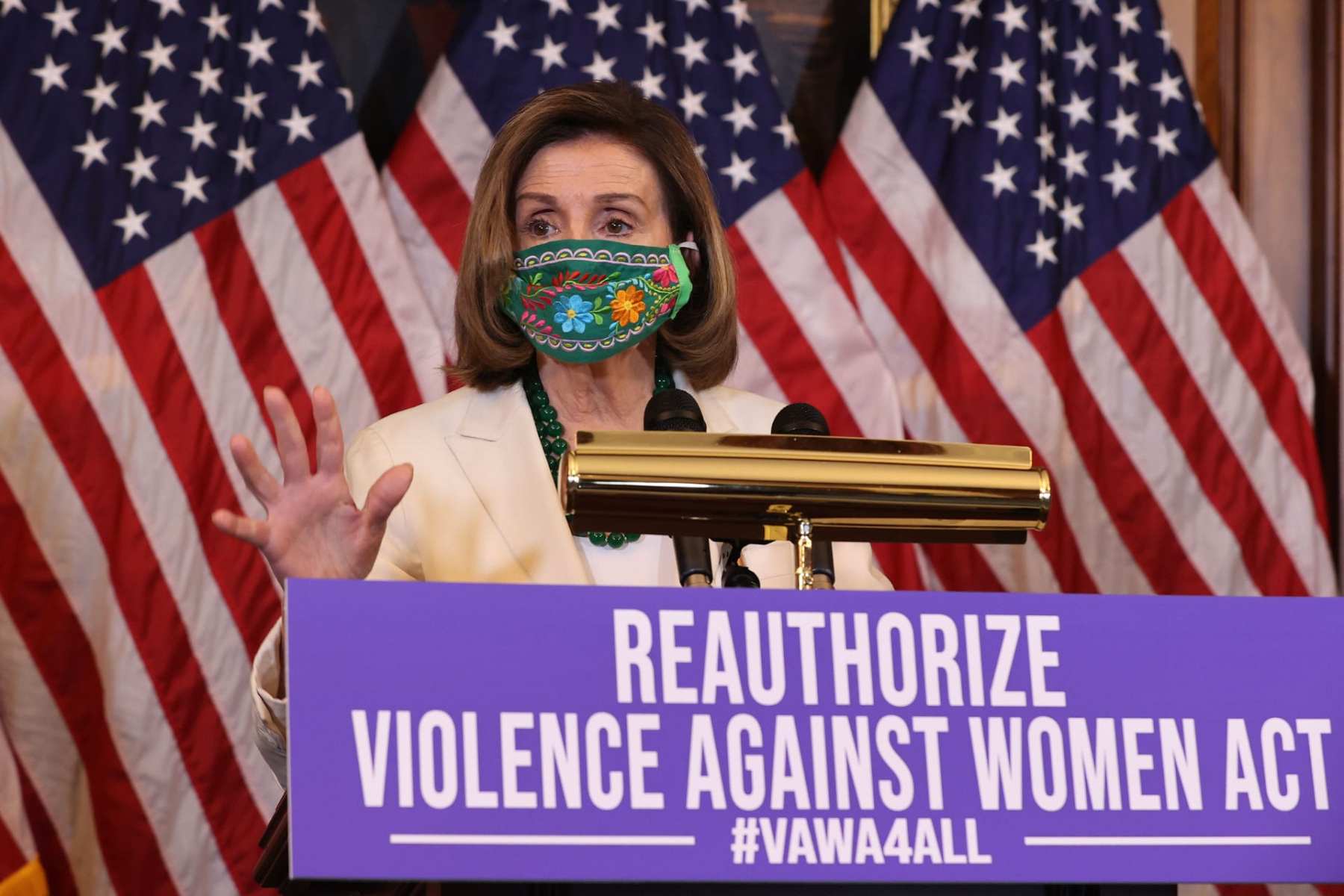The U.S. House of Representatives on Wednesday approve reauthorization of the Violence Against Women Act (VAWA) — a 1994 law credited with significantly reducing intimate partner violence. The renewal has taken on new urgency as rates of domestic violence have surged during the COVID-19 pandemic.
President Joe Biden shepherded the law through Congress when he was a senator, and during his presidential campaign he frequently called to renew the legislation, which requires reauthorization every five years. Since Democrats now control the Senate as well as the House, the law’s advocates hope that Biden’s promise to prioritize VAWA’s renewal during his first 100 days in office could jump-start congressional negotiations that stalled in 2019 over a gun-safety provision.
The House approved the reauthorization by a 244-to-172 vote, with 29 Republicans joining Democrats to support the bill.
The current reauthorization adds a prohibition on gun purchases by individuals who have been convicted of domestic violence against a partner they are not married to — often referred to as closing the “boyfriend loophole” — and would extend tribal courts’ jurisdiction to non-Native American perpetrators of sexual assault and child abuse co-occurring with domestic violence, stalking and sex trafficking on tribal lands.
It would also make a “real commitment to ensuring culturally specific services are funded in a way that truly meets the needs of communities of color and underserved communities,” said Jennifer Becker, deputy legal director at Legal Momentum.
Previous renewals also gained bipartisan support, but during the last reauthorization push in 2019, language to close the boyfriend loophole was seen as a main reason the House-approved bill stalled in the Republican-led Senate. Democrats said then-Senate Majority Leader Mitch McConnell wanted to protect his members by not forcing them to vote for or against a bill that could anger the National Rifle Association, which had spent nearly $19 million during the previous election cycle, nearly all of which supported Republicans or opposed Democrats.
When the bill was reintroduced earlier this month, Biden urged lawmakers to “follow past precedent and bring a strong bipartisan coalition together for swift passage.”
“Delay is not an option, especially when the pandemic and economic crisis have only further increased the risks of abuse and the barriers to safety,” Biden said in a statement. “Domestic violence is being called a pandemic within the COVID-19 pandemic, with growing evidence showing that the conditions of the pandemic have resulted in escalated rates of intimate partner violence, and in some cases more severe injuries.”
Before the pandemic, 1 in 3 women and 1 in 4 men reported having experienced physical violence from an intimate partner in the United States. One in 4 women and 1 in 7 men have been victims of severe violence from intimate partners such as beating, burning or strangling, according to the National Coalition Against Domestic Violence.
Government data does not disaggregate sex from gender or account for nonbinary people, but research that does exist suggests transgender people face high rates of intimate partner violence and additional barriers to receiving help.
In the 25 years after VAWA’s passage, the rate of intimate partner violence dropped by more than 50 percent, according to government statistics.
VAWA requires congressional reauthorizations because it was written with a five-year sunset provision to update funding levels for its grant programs. Advocates of the law say it also provides opportunities for periodic substantive updates as well.
“The bill has evolved in each reauthorization,” said Lynn Hecht Schafran, the legal director at Legal Momentum.
“We have learned with each reauthorization about the needs of victims, enhancing education for law enforcement and judges. … Hearing from organizations and survivors has been a tremendous lesson, and of course learning about underserved populations,” said Hecht Schafaran, who worked closely with Biden and his Senate staff to write and pass the original VAWA.
If VAWA expires, as it did in early 2019, but is not reauthorized, its existing programs can be funded in budgets proposed by the president and approved by Congress. VAWA’s programs are currently funded via a 2021 appropriations bill passed by Congress late last year.
Democratic Sen. Amy Klobuchar of Minnesota earlier this month sent a letter to Biden with 26 other Democratic senators urging him to include funding for VAWA programs in his fiscal 2022 budget. They cited the COVID-19 pandemic’s impact on domestic violence rates as a complicating factor that necessitated swift action.
VAWA was reauthorized by bipartisan majorities in 2000 and 2005. During the Obama administration, a 2012 renewal pushed into 2013 after conservative lawmakers objected to the inclusion of protections for same-sex couples and undocumented immigrants. Both made it into the bill. It expired at the end of 2018 before being temporarily reauthorized through February 2019.
In April 2019, all House Democrats but one — Rep. Collin Peterson of Minnesota — were joined by 33 Republicans to pass a bipartisan update in the Democratic-controlled chamber. The legislation languished in the Senate, however, after negotiations broke down between Sen. Dianne Feinstein of California, then the top Democrat on the Judiciary Committee, and Sen. Joni Ernst of Iowa, a Republican on the panel then who is a survivor of domestic violence and sexual assault.
The two lawmakers were at an impasse over closing the boyfriend loophole. Ernst, echoing many of her Republican colleagues, was concerned that the provision would strip people of their Second Amendment right to bear arms. Though she said they came “very, very close” to agreeing on language, Feinstein in November 2019 introduced the House bill and Ernst proposed an alternative version. Each side accused the other of partisanship. McConnell never brought VAWA reauthorization up for a vote.
The House bill largely mirrors the one it passed in 2019. It was introduced by Democratic Reps. Sheila Jackson Lee of Texas and Jerrold Nadler of New York, along with Republican Rep. Brian Fitzpatrick of Pennsylvania, all of whom serve on the House Judiciary Committee. They were joined by 166 other Democratic colleagues and one Republican.
Ernst’s office did not respond to queries to discuss the role she would play in the next round of negotiations or the 2019 effort.
Current Senate Majority Leader Chuck Schumer in June 2020 told McConnell to take the languishing legislation “off the shelf” and hold a vote. It is near certain that passage would require 60 votes in the 100-seat chamber that is currently evenly split between Republicans and Democrats.
Feinstein and fellow Democratic Sen. Patrick Leahy of Vermont, a past chair of the Judiciary panel, said earlier this month that they were prepared to work with the current chair, Sen. Dick Durbin of Illinois, to advance the “long overdue” reauthorization.






